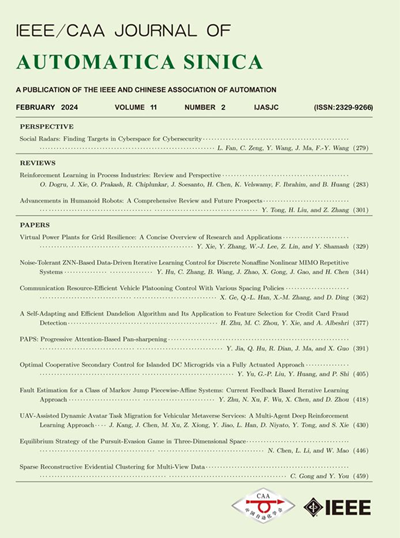Industry-Oriented Detection Method of PCBA Defects Using Semantic Segmentation Models
IF 15.3
1区 计算机科学
Q1 AUTOMATION & CONTROL SYSTEMS
引用次数: 0
Abstract
Automated optical inspection (AOI) is a significant process in printed circuit board assembly (PCBA) production lines which aims to detect tiny defects in PCBAs. Existing AOI equipment has several deficiencies including low throughput, large computation cost, high latency, and poor flexibility, which limits the efficiency of online PCBA inspection. In this paper, a novel PCBA defect detection method based on a lightweight deep convolution neural network is proposed. In this method, the semantic segmentation model is combined with a rule-based defect recognition algorithm to build up a defect detection framework. To improve the performance of the model, extensive real PCBA images are collected from production lines as datasets. Some optimization methods have been applied in the model according to production demand and enable integration in lightweight computing devices. Experiment results show that the production line using our method realizes a throughput more than three times higher than traditional methods. Our method can be integrated into a lightweight inference system and promote the flexibility of AOI. The proposed method builds up a general paradigm and excellent example for model design and optimization oriented towards industrial requirements.利用语义分割模型检测 PCBA 缺陷的行业导向方法
自动光学检测(AOI)是印刷电路板组装(PCBA)生产线中的一项重要工序,旨在检测 PCBA 中的微小缺陷。现有的自动光学检测设备存在吞吐量低、计算成本高、延迟大、灵活性差等缺陷,限制了在线 PCBA 检测的效率。本文提出了一种基于轻量级深度卷积神经网络的新型 PCBA 缺陷检测方法。在该方法中,语义分割模型与基于规则的缺陷识别算法相结合,构建了一个缺陷检测框架。为了提高模型的性能,从生产线上收集了大量真实的 PCBA 图像作为数据集。根据生产需求在模型中应用了一些优化方法,使其能够集成到轻量级计算设备中。实验结果表明,使用我们的方法的生产线的吞吐量比传统方法高出三倍多。我们的方法可以集成到轻量级推理系统中,提高自动光学检测的灵活性。所提出的方法为面向工业需求的模型设计和优化建立了通用范例和优秀范例。
本文章由计算机程序翻译,如有差异,请以英文原文为准。
求助全文
约1分钟内获得全文
求助全文
来源期刊

Ieee-Caa Journal of Automatica Sinica
Engineering-Control and Systems Engineering
CiteScore
23.50
自引率
11.00%
发文量
880
期刊介绍:
The IEEE/CAA Journal of Automatica Sinica is a reputable journal that publishes high-quality papers in English on original theoretical/experimental research and development in the field of automation. The journal covers a wide range of topics including automatic control, artificial intelligence and intelligent control, systems theory and engineering, pattern recognition and intelligent systems, automation engineering and applications, information processing and information systems, network-based automation, robotics, sensing and measurement, and navigation, guidance, and control.
Additionally, the journal is abstracted/indexed in several prominent databases including SCIE (Science Citation Index Expanded), EI (Engineering Index), Inspec, Scopus, SCImago, DBLP, CNKI (China National Knowledge Infrastructure), CSCD (Chinese Science Citation Database), and IEEE Xplore.
 求助内容:
求助内容: 应助结果提醒方式:
应助结果提醒方式:


